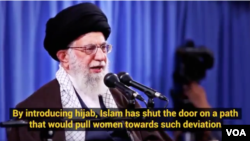Iran’s Supreme Leader has drawn scrutiny of his nation’s treatment of women by saying the head-covering they are compelled to wear in public can save women in the West from sexual assault.
Ayatollah Ali Khamenei extolled what he described as the virtues of the hijab, an Islamic female head-covering, in a video posted to his Twitter account Wednesday.
In a tweeted message accompanying the video, he said the hijab is an Islamic solution to what he called the “disaster of countless sexual assaults on Western women — including incidents leading to #Metoo campaign.” He was referring to the global movement of women who say they have suffered and survived sexual abuse at the hands of men or boys.
Khamenei timed his tweet to coincide with the first anniversary of an Oct. 5, 2017, New York Times report detailing sexual harassment allegations by female employees against American movie producer Harvey Weinstein. Days later, the article led actress Alyssa Milano to urge people to tweet #MeToo if they also have been sexually harassed. The hashtag quickly went viral.
In Khamenei’s video, which shows excerpts of a speech he delivered in March, he says: “A large number of Western female politicians announced one right after another that they had been subjected to abuse, harassment, or violence at times while they were working in government offices. By introducing the hijab, Islam has shut the door on a path that would pull women towards such deviation. … Islam does not allow this through the hijab.”
Compulsory hijab
Masih Alinejad, a freelance host of VOA Persian’s Tablet program and a prominent exiled Iranian campaigner against Iran’s compulsory hijab for women, said Khamenei’s comments portray women as responsible for any sexual harassment that they experience.
“If Khamenei, who is the symbol of suppression of women in Iran, focused on the harassers instead of blaming women, then Iranian women would be more courageous and feel more free to speak about sexual harassment cases happening in the country,” Alinejad said in an appearance on the Thursday edition of VOA Persian’s News at Nine show.
In an April 2017 article, Iran’s reformist Shargh newspaper quoted the Iranian judiciary’s deputy chief of strategic affairs, Hossein Ghanbarnejad, as saying there was a sharp increase in cases of sexual harassment of women from 2010 to 2014. He said the judiciary recorded about 72,000 harassment cases in 2010, a figure that he said jumped by 98 percent to 142,933 cases registered by police in 2014.
A May 2017 report by U.S.-based group Human Rights Watch, about discrimination against women in the Iranian job market, led with the following critique: “Women in Iran confront an array of legal and social barriers, restricting not only their lives but also their livelihoods, and contributing to starkly unequal economic outcomes.”
HRW said managers and employees whom it interviewed spoke of not being aware of any anti-sexual harassment policies at their place of employment. It said several women also reported instances of sexual harassment.
Wrong lesson from #MeToo
Alinejad said Khamenei was drawing the wrong lesson from the West’s public outcry about cases of sexual abuse of women.
“He has not realized that the #MeToo movement and sexual harassment scandals in the West are in fact an indication that women are getting stronger in Western countries — women who were silenced for years and blamed in these cases,” she said.
This article originated in VOA’s Persian Service.














